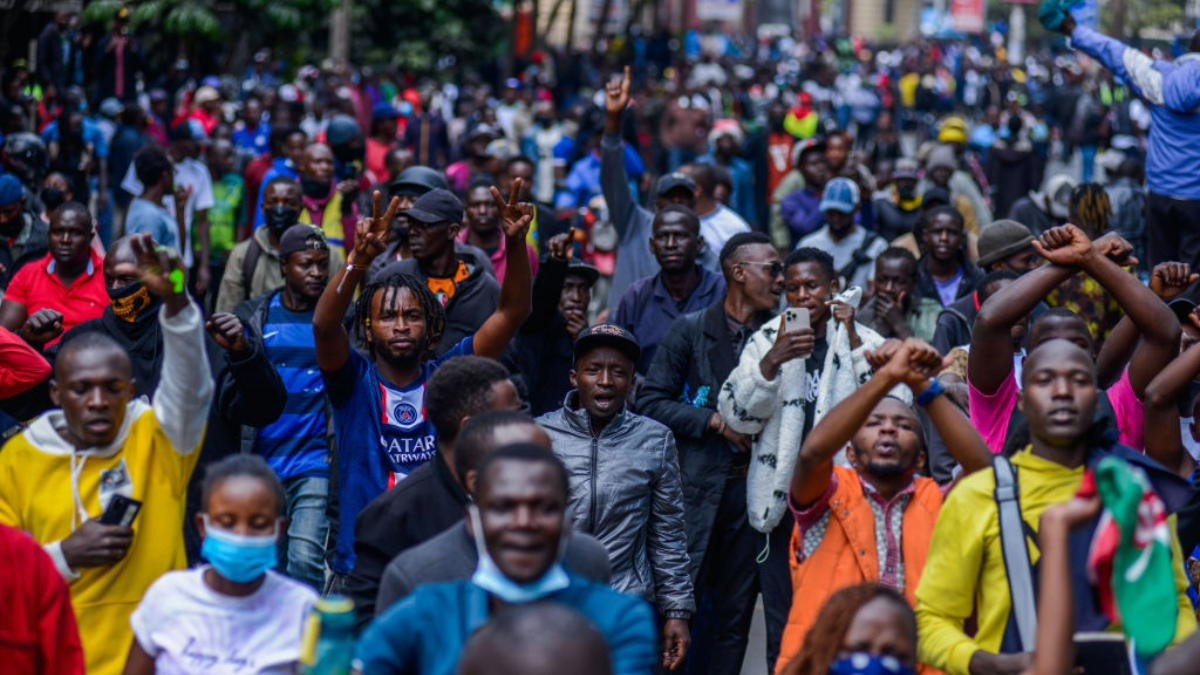Redefining AI for Africa: The Role of Artificial Intelligence in Kenya’s Grassroots Movement
Diana Kemunto Nyakundi, Liz Orembo / Jul 30, 2024
NAIROBI, KENYA - JULY 23: Demonstrators opposed to the "Finance Bill 2024" march towards the parliament building to protest against the Kenyan President William Ruto. (Photo by Gerald Anderson/Anadolu via Getty Images)
The promise of digital technologies to leapfrog Africa’s current stage of development is not new. Rather, it is a sentiment that has pervaded policy discussions over a few decades. This optimism stems from the continent’s unique socio-economic landscape, characterized by rapid urbanization, a youthful population and increased internet access. In most African countries, the youth — those 35 years and younger — comprise most of the population.
However, despite a youthful population, improved access to the internet and digital technologies, alongside rising literacy levels and digital fluency, Africa still lags far behind in realizing its own development goals. We need a critical rethink of policies in the realm of artificial intelligence to respond to the persistent struggle for Africa’s technological development. The events surrounding the ongoing protests in Kenya could provide necessary insights as to how to do so.
Contextualizing Kenyan protests
It's been approximately one month since Kenyans, and largely young Kenyans, took to the streets to voice frustration with the current government. While the immediate trigger was the Finance Bill 2024, legislation which proposed higher taxes amidst an already high cost of living, the protests are rooted in deep-seated issues, such as rampant corruption, unfulfilled promises by the government, and the opulence and arrogance of state officers. The 2024 Finance Bill is seen as a blatant cash grab from the poor to fund the luxurious lifestyles of the rich political class, fueling the ongoing unrest. These protests have drawn significant local and global attention due to their unprecedented nature. They mark a first in Kenya's history, setting a new precedent for civil unrest and activism.
The movement started when activists circulated cell phone numbers of Members of Parliament, a strategic move to directly express concerns about the Finance Bill and urge politicians to vote against it. This is what marked the beginning of a creative and impactful use of technology to drive accountability and push for change, led by Kenya's Gen Z, a digitally savvy and fearless generation disillusioned with the current state of affairs. This generation has shown a marked disengagement from traditional politics, with the last general election witnessing the lowest youth turnout in recent history. For many Gen Zs, the political landscape has remained stagnant, dominated by the same leaders for decades. This group is the first to fully benefit from the government's free primary and secondary education, which has successfully reached both rural and urban areas. Unlike Gen X and some millennials, Gen Z has grown up under a progressive Kenyan constitution, largely missing the 'Moi Era' — a period marked by open dictatorship and severe human rights abuses.
On June 28th, 2024, facing a heavily armed police force, Gen Z protesters boldly marched into the Parliament building following the passage of the controversial Finance Bill. Lacking central leadership and political backing, they were equipped only with water, identification cards, and mobile phones. These devices became tools of resistance, enabling them to use digital platforms to challenge impunity and call for accountability. This grassroots movement underscores the generational shift in how political engagement and activism are being redefined in Kenya.
Creative uses for digital tools during protests
As the movement progressed, more technology was incorporated to creatively and effectively hold the government accountable. The youth, in their different professions and talents, worked tirelessly to offer free services such as legal and health support for protesters. Journalists working as freelancers and those in media houses worked with protesters to record and identify cases of police brutality. Data journalists and data scientists crafted striking graphics to expose the financial excesses in the Finance Bill. Canva templates were shared as open-source designs to those who wished to write messages in graphics to share on social media and in messaging apps.
These visuals not only vividly demonstrated how embezzled funds could significantly benefit essential sectors like rural Kenya's school feeding programs, but also starkly connected the unbearable cost of living to poor governance and the opulence of politicians, driving people to the streets in protest. Despite Kenya’s diversity and inequalities, there was a remarkable convergence in communications. AI and other digital technologies helped reach people at their different points of literacy and digital engagement. Various platforms were used to disseminate campaign messages, communication strategies for protesters, and resources for health and legal aid. The process aimed to reflect Kenya’s culture, infused with creativity, humor, satire and resourcefulness.
The tech community developed 'Finance Bill GPT,' the first Kenyan-made custom GPT tool, trained on the Finance Bill and various journalistic articles. This tool was designed to help citizens understand the now-scrapped draft law and answer queries from the Auditor-General’s report for the 2022/23 financial year. Following this, other GPTs were created, such as 'SHIF GPT' for the Social Health Insurance Fund, 'Kenya Law Guide' for constitutional elements, and 'Corrupt Politicians GPT' to expose corruption cases involving Kenyan politicians, providing detailed information and sources for each case.
On TikTok, youth volunteers translated the contentious Bill into numerous local languages, ensuring that the older generation, rural citizens, and laypeople could understand it and participate in the democratic process. This initiative helped garner significant support from the older generation, who had previously been passive observers of the protests. To further democratize these initiatives and support ground protests, a USSD code – similar to SMS – was developed to report arrests and police brutality, mobilize legal support, and seek medical emergency assistance. This code provided a lifeline for real-time reporting and emergency support while enhancing the safety and coordination of protest activities.
Tech platforms such as M-changa consolidated and banked millions of funds contributed by Kenyans of goodwill to assist in offsetting the medical and funeral expenses of fellow protesters. The funds were managed without the holders being in contact with it, and the platforms automatically made transaction information and balances available to the public. Despite misinformation efforts by the government to derail the protests, the transparency facilitated by M-changa created a robust public trust. As the protests continue, the Kenyan tech community continues to explore the use of AI and other digital technologies for government accountability. Methods include documenting cases of corruption, tracking the delivery of government promises, and tracking videos from protesters to identify the police officers captured exercising extra-judicial force.
The state of AI development In Africa
As AI proliferates in our societies, different countries have adopted these technologies at varying speeds. African countries are currently focused on drafting AI strategies with key pillars centered around skilling and reskilling citizens, building infrastructure for AI, and ensuring the availability of data to align with global standards. The African Union's African AI Strategy and the African Global Digital Compact, passed by African Ministers in June, seek African-owned, development-oriented, inclusive and people-centred solutions. Similar to strategies in other regions, Africa aspires to leverage AI opportunities while minimising threats and addressing African realities in their various contexts to enhance overall well-being.
Numerous indices, such as Oxford Insights, The Global Index on Responsible AI, Stanford AI Index, and UNESCO's Readiness Assessment Methodology (RAM), measure and rank countries based on their AI use and readiness. These indices examine multiple dimensions of readiness, including technological infrastructure, legislation, digital skills, government innovation, and data capabilities. Countries from the Global South, particularly Sub-Saharan Africa, have often ranked low on these indices or been left out altogether because they did not meet these set metrics.
However, the ongoing protests in Kenya have revealed that the pathway to AI development in Africa can be distinct from the traditional business and economic frameworks typically emphasized. These events have shown that AI can be harnessed to address societal issues by leveraging the unique strengths and unity within African communities. This community-centric approach not only transcends perceived barriers but also presents unique opportunities and low-hanging fruits for AI deployment in Africa, even in the absence of top-tier rankings on global indices.
Within this context, Africa should prioritize strengthening regional networks to foster a unified approach to AI development, resource sharing and the mitigation of common challenges. The continent should focus on creating localized AI solutions that reflect its rich diversity in cultures, languages, and societal needs. This includes developing and supporting multilingual AI platforms to ensure broader accessibility and engagement, allowing AI technologies to be more inclusive and relevant to all segments of society. The protests highlight that community-driven initiatives, grounded in the spirit of Ubuntu — a philosophy emphasizing collective responsibility and interconnectedness — can serve as powerful catalysts for technological and social advancement.
Authors

